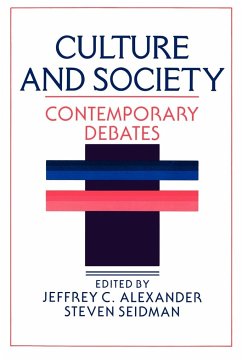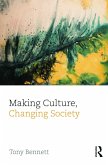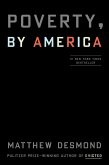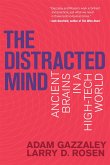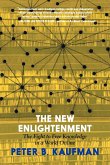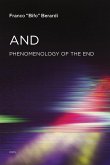C. Alexander / Steven Seidman (eds.)Contemporary Debates
Culture and Society
Contemporary Debates
Herausgeber: Alexander, Jeffrey C.; Seidman, Steven
C. Alexander / Steven Seidman (eds.)Contemporary Debates
Culture and Society
Contemporary Debates
Herausgeber: Alexander, Jeffrey C.; Seidman, Steven
- Broschiertes Buch
- Merkliste
- Auf die Merkliste
- Bewerten Bewerten
- Teilen
- Produkt teilen
- Produkterinnerung
- Produkterinnerung
This volume brings together the major statements by the leading contemporary scholars of cultural analysis on the relationship between culture and society.
Andere Kunden interessierten sich auch für
![Making Culture, Changing Society Making Culture, Changing Society]() Tony BennettMaking Culture, Changing Society57,99 €
Tony BennettMaking Culture, Changing Society57,99 €![The Persuaders The Persuaders]() Anand GiridharadasThe Persuaders27,99 €
Anand GiridharadasThe Persuaders27,99 €![Regarding the Pain of Others Regarding the Pain of Others]() Susan SontagRegarding the Pain of Others15,99 €
Susan SontagRegarding the Pain of Others15,99 €![Poverty, by America Poverty, by America]() Matthew DesmondPoverty, by America16,99 €
Matthew DesmondPoverty, by America16,99 €![The Distracted Mind The Distracted Mind]() Adam Gazzaley (Professor, University of California, San Francisco)The Distracted Mind18,99 €
Adam Gazzaley (Professor, University of California, San Francisco)The Distracted Mind18,99 €![The New Enlightenment and the Fight to Free Knowledge The New Enlightenment and the Fight to Free Knowledge]() Peter B. KaufmanThe New Enlightenment and the Fight to Free Knowledge23,99 €
Peter B. KaufmanThe New Enlightenment and the Fight to Free Knowledge23,99 €![And And]() Franco "Bifo" BerardiAnd23,99 €
Franco "Bifo" BerardiAnd23,99 €-
-
-
This volume brings together the major statements by the leading contemporary scholars of cultural analysis on the relationship between culture and society.
Hinweis: Dieser Artikel kann nur an eine deutsche Lieferadresse ausgeliefert werden.
Hinweis: Dieser Artikel kann nur an eine deutsche Lieferadresse ausgeliefert werden.
Produktdetails
- Produktdetails
- Verlag: Cambridge University Press
- Seitenzahl: 384
- Erscheinungstermin: 19. August 1990
- Englisch
- Abmessung: 229mm x 152mm x 23mm
- Gewicht: 592g
- ISBN-13: 9780521359399
- ISBN-10: 0521359392
- Artikelnr.: 22351014
- Herstellerkennzeichnung
- Libri GmbH
- Europaallee 1
- 36244 Bad Hersfeld
- gpsr@libri.de
- Verlag: Cambridge University Press
- Seitenzahl: 384
- Erscheinungstermin: 19. August 1990
- Englisch
- Abmessung: 229mm x 152mm x 23mm
- Gewicht: 592g
- ISBN-13: 9780521359399
- ISBN-10: 0521359392
- Artikelnr.: 22351014
- Herstellerkennzeichnung
- Libri GmbH
- Europaallee 1
- 36244 Bad Hersfeld
- gpsr@libri.de
Introduction Part I. Analytic Debates: 'Understanding the Relative Autonomy of Culture' introduction
The case for culture 1. The human studies
2. Values and social systems
3. Culture and ideological hegemony
4. Signs and language
Approaches to culture Functionalist 1. The normative structure of science
2. Values and democracy
Semiotic 3. The world of wrestling
4. Food as symbolic code
Dramaturgical 5. Out of frame activity
6. The Balinese cockfight as play
Weberian 7. Puritanism and revolutionary ideology
8. French catholicism and secular grace
Durkheimian: 9. Lininality and community
10. Symbolic pollution
11. Sex as symbol in Victorian purity
Marxian 12. Class formation and ritual
13. Masculinity and factory labor
Post-structuralist: 14. Artistic taste and cultural capital
15. Sexual discourse and power
Part II. Substantive Debates: Moral Order and Crisis: Perspectives on Modern Culture
The Place of Religion: Is modernity a Secular or Sacred Order? Introduction: 1. Social sources of secularization
2. The future of religion Wolfgang 3. Civil religion in America
The debate over the 'End of Ideology': can secular reason create cultural order? 4. Culture industry revisited
5. From consensual order to instrumental control
6. The end of ideology in the west
7. Beyond coercion and crisis: the coming of an era of voluntary community
8. Ideology, the cultural apparatus, and the new consciousness industry
Modernism or post-modernism: dissolution of reconstruction of moral order? 9. Post-modernism and the dissolution of moral order
10. The post-modern condition
11. Modernity versus postmodernity
12. Mapping the post-modern.
The case for culture 1. The human studies
2. Values and social systems
3. Culture and ideological hegemony
4. Signs and language
Approaches to culture Functionalist 1. The normative structure of science
2. Values and democracy
Semiotic 3. The world of wrestling
4. Food as symbolic code
Dramaturgical 5. Out of frame activity
6. The Balinese cockfight as play
Weberian 7. Puritanism and revolutionary ideology
8. French catholicism and secular grace
Durkheimian: 9. Lininality and community
10. Symbolic pollution
11. Sex as symbol in Victorian purity
Marxian 12. Class formation and ritual
13. Masculinity and factory labor
Post-structuralist: 14. Artistic taste and cultural capital
15. Sexual discourse and power
Part II. Substantive Debates: Moral Order and Crisis: Perspectives on Modern Culture
The Place of Religion: Is modernity a Secular or Sacred Order? Introduction: 1. Social sources of secularization
2. The future of religion Wolfgang 3. Civil religion in America
The debate over the 'End of Ideology': can secular reason create cultural order? 4. Culture industry revisited
5. From consensual order to instrumental control
6. The end of ideology in the west
7. Beyond coercion and crisis: the coming of an era of voluntary community
8. Ideology, the cultural apparatus, and the new consciousness industry
Modernism or post-modernism: dissolution of reconstruction of moral order? 9. Post-modernism and the dissolution of moral order
10. The post-modern condition
11. Modernity versus postmodernity
12. Mapping the post-modern.
Introduction Part I. Analytic Debates: 'Understanding the Relative Autonomy of Culture' introduction
The case for culture 1. The human studies
2. Values and social systems
3. Culture and ideological hegemony
4. Signs and language
Approaches to culture Functionalist 1. The normative structure of science
2. Values and democracy
Semiotic 3. The world of wrestling
4. Food as symbolic code
Dramaturgical 5. Out of frame activity
6. The Balinese cockfight as play
Weberian 7. Puritanism and revolutionary ideology
8. French catholicism and secular grace
Durkheimian: 9. Lininality and community
10. Symbolic pollution
11. Sex as symbol in Victorian purity
Marxian 12. Class formation and ritual
13. Masculinity and factory labor
Post-structuralist: 14. Artistic taste and cultural capital
15. Sexual discourse and power
Part II. Substantive Debates: Moral Order and Crisis: Perspectives on Modern Culture
The Place of Religion: Is modernity a Secular or Sacred Order? Introduction: 1. Social sources of secularization
2. The future of religion Wolfgang 3. Civil religion in America
The debate over the 'End of Ideology': can secular reason create cultural order? 4. Culture industry revisited
5. From consensual order to instrumental control
6. The end of ideology in the west
7. Beyond coercion and crisis: the coming of an era of voluntary community
8. Ideology, the cultural apparatus, and the new consciousness industry
Modernism or post-modernism: dissolution of reconstruction of moral order? 9. Post-modernism and the dissolution of moral order
10. The post-modern condition
11. Modernity versus postmodernity
12. Mapping the post-modern.
The case for culture 1. The human studies
2. Values and social systems
3. Culture and ideological hegemony
4. Signs and language
Approaches to culture Functionalist 1. The normative structure of science
2. Values and democracy
Semiotic 3. The world of wrestling
4. Food as symbolic code
Dramaturgical 5. Out of frame activity
6. The Balinese cockfight as play
Weberian 7. Puritanism and revolutionary ideology
8. French catholicism and secular grace
Durkheimian: 9. Lininality and community
10. Symbolic pollution
11. Sex as symbol in Victorian purity
Marxian 12. Class formation and ritual
13. Masculinity and factory labor
Post-structuralist: 14. Artistic taste and cultural capital
15. Sexual discourse and power
Part II. Substantive Debates: Moral Order and Crisis: Perspectives on Modern Culture
The Place of Religion: Is modernity a Secular or Sacred Order? Introduction: 1. Social sources of secularization
2. The future of religion Wolfgang 3. Civil religion in America
The debate over the 'End of Ideology': can secular reason create cultural order? 4. Culture industry revisited
5. From consensual order to instrumental control
6. The end of ideology in the west
7. Beyond coercion and crisis: the coming of an era of voluntary community
8. Ideology, the cultural apparatus, and the new consciousness industry
Modernism or post-modernism: dissolution of reconstruction of moral order? 9. Post-modernism and the dissolution of moral order
10. The post-modern condition
11. Modernity versus postmodernity
12. Mapping the post-modern.

